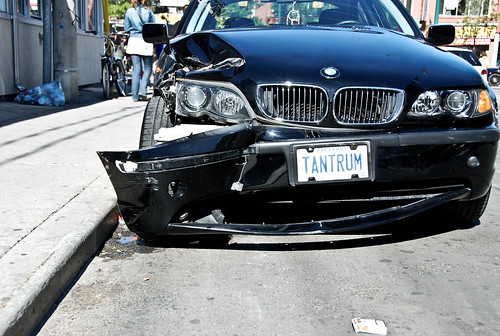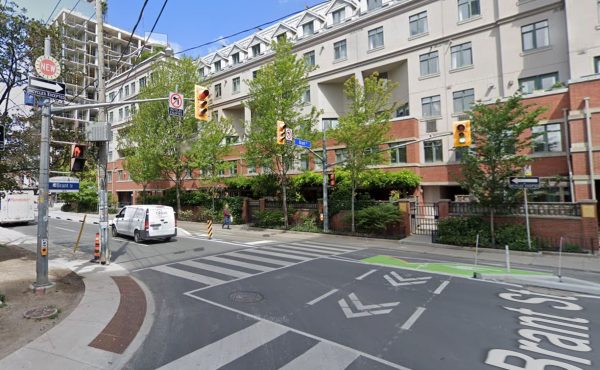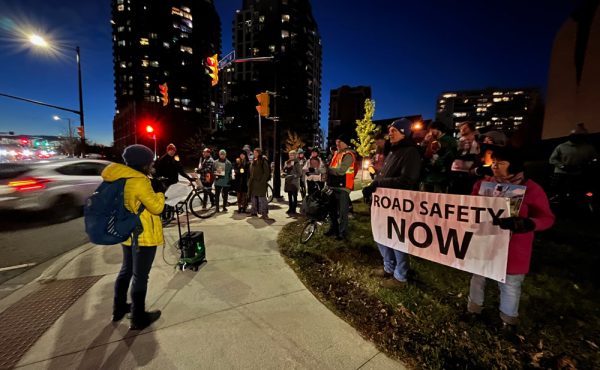
Toronto lawyer Patrick Brown sent out a mass e-mail this evening warning of troubling developments for non-drivers (people without auto insurance) in new regulations being proposed for the insurance industry by Ontario’s minister of finance, Dwight Duncan. I haven’t had the opportunity to do research on the new regulations beyond reading what’s in today’s newspaper, which brands the regulation as financial relief for motorists. I’m providing the e-mail here for your information and discussion.
This morning I attended a stakeholders meeting with the Ministry of Finance regarding the new changes to auto insurance. It is now on the news.
The present law reform is not fair to cyclists, public transit users or pedestrians.
Today I specially asked whether the reduce benefits being proposed will apply to innocently injured cyclists, pedestrians and transit users. The answer was “yes”.
The system here in Ontario is complex to say the least, but I will try to simplify as best I can the issue below.
When anyone (including cyclist, pedestrian car driver) is injured or killed by a bad driver (even a drunk driver), they will have various benefits available to them. These include various things to help them get better. Medical benefits, rehab benefits, attendant care etc.
With the new changes introduced today, many benefits are being drastically reduced. However, the justification for such a reduction is “consumer choice”.
The new insurance reforms provide an option to the auto insurance policy holders to increase the amount of their benefits if they so chose. They simply up the premium in the policy.
However, if you are a cyclist, pedestrian or transit user, and do not have a car insurance policy, you do not have the ability to buy up on your benefits. You have no policy to do so. You must accept these reductions.
Essentially your benefits (if you are part of this group) have just been drastically reduced without the choice of getting more coverage.
How significant are these changes to cyclist and pedestrians. The following are the amount of benefits being reduced:
1. Medical Rehabilitation Benefits (non catastrophically injured) are being reduced from $100,000 to $50,000
2. Attendant Care Benefits (for non catastrophically injured) are being reduced from $72,000 to $36,000.00
3. Housekeeping and caregiver benefits eliminated.The insurance companies argue “consumer choice”. Ie if you want more benefits you can pay an increased premium. Unfortunately that does not help those without car insurance policies and who elect to travel by a safer and less environmentally intrusive mode of transportation. Many students, seniors, and lower income households do not have vehicles in the city. They do not have car insurance policies. They do not cause injuries. But they do get doored, hit, and stuck down all the time! I also suspect it will continue for some time.
The Government however did do something right. They restored access to claim compensation when someone is killed by a negligent driver. They announced today the revocation of the $15,000 deductible. Many cyclist advocated push to change this. This is a good thing for many who lose a loved one. For instances to give some context, when Ryan Carriere was killed cycling on Queen by a negligent truck driver (four Halloweens ago), his family had $90,000 in deductibles taken away from them. Despite successfully proving it was the truck drivers fault and being successful in their law suit. This was simply taken away as a deductible.
The Government will be moving forward in the next two month to draft regulations to bring the above laws into force next year. It is uncertain if they will change this unjust result regarding (cyclist and pedestrian who do not have auto insurance) benefit reduction.
I strongly urge you to let your members know this. This issue will be overshadowed by the lawyers, insurance industry and health professionals during the present media attention to this issue.
http://www.news.ontario.ca/mof/en/2009/11/ontario-providing-choice-in-auto-insurance.html
Patrick Brown
McLeish Orlando LLP
1 Queen St. East
Suite 1620, Box 76
Toronto, Ontario
M5C 2W5
http://www.mcleishorlando.com/




17 comments
Not quite sure I get the logic of this. And I find it kind of rich that McLeish Orlando, Personal Injury Lawyers, are warning us that the “issue will be overshadowed by the lawyers”.
There’s also the possibility that this will open up the market – and it is hoped, not the requirement – for cyclists, pedestrians and public transit users to have insurance.
I had bike insurance in the UK that had a clause for additional injury cover.
Wow, you just publish a personal injury lawyer’s press release verbatim. That’s some scratch journalism there guys!
I have come to expect better from Spacing.
What you wrote is slightly misleading because it doesn’t give proper context. Claims by non-drivers are extremely high in Ontario (according to several newspaper articles in Toronto) and from a user’s standpoint, claims from very minor injuries are being milked by non-drivers and by people/companies who provide care services. At the same time, the claims limit for non-drivers are higher here in Ontario than any other province in Canada and significantly higher in some categories. So this announcement simply re-adjusts the maximum payouts or claims people can make in Ontario compared to the rest of Canada (albeit the re-adjusted maximum claims are still very high/generous in Ontario).
matt> I think this piece was quite clear who was writing it, much like an op ed opinion piece in any paper. Do you object to those too?
Why should I as a cyclist or pedestrian need my own insurance in case I’m injured by an auto?
This initiative unloads car insurance premiums onto the victims. As such once again auto drivers are allowed to change the rules in their favour, not the population as a whole.
Matt et al.,
I was exceedingly clear about where this was coming from and that the information contained within hadn’t been vetted beyond the “this is interesting, people should know of this opinion” stage. It was intended to illicit discussion along the lines of what JT contributed.
Considering that all the coverage of this issue to date has been from a driver’s perspective, I can’t say I regret airing Patrick Brown’s point of view, even if it is, at least in part, a self-interested opinion for him to hold.
I’m a cyclist who was hit by a car 2 years ago at no fault of my own. I can tell you the current rules are enough to send you in to depression. Also just cause they’re laws doesn’t mean the insurance companies won’t fight every single claim and if they do reimburse you they’ll do 6 months after you need it. It sucks for me but I don’t wish what it is going to be like if this goes through on my worst enemy.
The reason I found this post strange and substandard is the entirely naked self interest of the verbatim email that was reprinted. I’m accustomed to Spacing posting enlightening information, comment and analysis. A position piece by a lawyer who wants to suck more money out of the system is in no way that.
This is a complicated issue, as JT pointed out, and one that matters to your readership. Rather than providing space for an ambulance chaser to sound off, I think some analysis of the issue would have been more in line with your normal standards.
…I find it kind of rich that McLeish Orlando, Personal Injury Lawyers, are warning us that the “issue will be overshadowed by the lawyersâ€Â.
Sure, personal injury lawyers are a pretty easy target… but once you’ve been up against an insurer’s and its representatives, you may find your views have moderated.
Speaking of context, here’s some background on Patrick Brown from his bio (can’t link, it’s in Flash):
Folks, I’m not going to pass judgement on the bill itself on here as I’m related to someone who works in the area, but before you jump down the trial lawyer’s throat educate yourselves on what would happen if you have an injury causing accident, who pays what to whom and when. You will probably be surprised/outraged by what you find out.
Here’s one description – don’t know the firm and am not a lawyer so don’t know if it’s 100pc accurate but it will get you started and show you what to google search: http://www.hg.org/article.asp?id=6033
Only a root and branch change to the system of making claims and what happens after the settlement will make a difference, but that won’t win any votes because it can’t be spun as “definitely” reducing premiums and there’s likely to be reluctance to change an imperfect but workable status quo.
One point that does occur to me without again claiming this is what the bill does… just hypothetically… should we make housing more affordable by cutting corners in the Ontario Building Code or eliminating building permits?
I found the text of the email ungrammatical and obtuse to the point of being difficult to understand. The meaning used may be obvious to people who have been involved in an accident already or are otherwise familiar with liability insurance, but many of us are not in that situation.
The author mentions a reduction in “benefits” to accident victims, but it’s not clear who pays these benefits, why they are being reduced, or what he’s proposing. Is he suggesting there is a need for an insurance product that pedestrians and cyclists could buy in case they are hurt in an accident? I hope not.
The paragraph on claims compensation / deductibles was almost incomprehensible. I gather that it’s good that the deductibles are being “revoked” but there is no context provided other than a reference to a case in which a family had “$90,000 in deductibles taken away” with no explanation of what that means.
While it is worthwhile to bring issues like this to the public’s attention, some editing and context could have helped make this a more substantive discussion.
Having just insured a vehicle in New York and waded through the complex and arcane insurance terms (Bodily Injury, Property, PIP, OBEL, APIP…) all I can say is that this is a pretty messy topic. Don’t forget that this is a probability calculation as well as about total incident coverage. I live in New York City, which is packed with people who are typically underinsured and super-litigious. However, I take transit to work and only drive on shopping or travel trips every other weekend or so. So while the coverage I need for any incident is liekly very high, my statistical risk is very low because I drive very few miles. How do you balance that to come up with an appropriate number?
I would like to know what the insurance minimums are in Ontario compared to a sample set of, say, Quebec, BC, California, New York, Oregon, Holland, Germany, UK, Denmark, Sweden… As long as we are somewhere in the middle of that mix we should be somewhere near the right balance. If we have crazy outliers one way or the other they should of course be looked at more closely.
We are not the only jurisdiction with urban areas filled with pedestrians, cars and bikes. Go with hard comparative data for the analysis from peers rather than a plea from a party with a conflict of interest like an insurance firm or trial lawyer.
for a fresh perspective, my occupational therapist friend and many of her colleagues are totally opposed to lower insurance coverage for drivers and therefore for accident victims. such changes literally hurt the victims only.
my friend’s job includes helping people who have been seriously injured regain as many motor skills as possible, and helping find ways to accommodate permanent loss of abilities. in other words, she’s in the know about what happens to injured people when the danger has passed and it’s a matter of getting on with life.
I thought about this some more last night, as accusations of harming one group over another really bother me. A very simple fix may be in order — tie rates very, very closely to odometer readings, turning insurance into a pay-as-you-go user fee and not an all-you-can-eat buffet. In this way, you could have very high minimums to protect victims, but people who drive less would pay less since they are statistically less at risk of an accident. This would also have the benefit of making heavy auto users pay the true costs of using their cars and reward those who left the car at home and took transit when possible.
The pay-per-km approach is simple to execute in an age of digital odometers and frequent inspections. A few states in the US have started a pilot program with Progressive Insurance:
http://www.vcstar.com/news/2009/nov/03/pay–you-drive-car-insurance-revs/?print=1
This might be the way to go in the future to make everyone happy.
Thank you for putting this warning out/up there. Yes, Mr. Brown could be self-interested, but his bio and his track record are fairly decent. And this topic is sufficiently obscure, and the changes that can be made in obscurity can be important enough, that even if it is a bit hard to read through content and a less clear writing style, it’s still imortant, and we don’t always have the time and expertise to make up our own posts do we?
I liked the licence plate too – made me think of Mr. Bryant.
Why don’t cyclists get insurance? Is it available?
The laws that you describe are terribly unjust. It may require cyclists to take out insurance, but it is unusual for pedestrians. They do not have to pay for the mistakes of motorists.